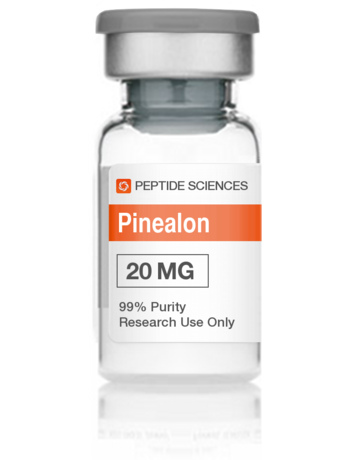Preparation Pinealon
Pinealone is an oligopeptide containing glutamyl-asparagine-arginine (Glu-Asp-Arg). Studies have shown that the pineal gland has many geroprotective properties and can reduce the effects of aging. The benefits of the pineal gland are especially noticeable in the brain and cardiovascular system. It is believed that the tripeptide reduces free radical damage and, thus, reduces or even restores long-term damage caused by active forms of oxygen (free radicals).
Studies of the action of Pinealon
Modern research in the field of the pineal gland is focused on its ability to prevent oxidative damage and, thus, reduce the negative consequences of aging. Oxidation is a by-product of normal metabolism, in which active forms of oxygen (also called free radicals) chemically interact with healthy tissues, causing damage. This damage is one of the main factors contributing to the aging process. In healthy people free radicals are "purified" natural mechanisms that are helped by antioxidants in the diet. Unfortunately, these natural mechanisms themselves are subject to the aging process and become less effective over time. No amount of antioxidant consumption is enough to compensate for this decline in function.
Studies in rats show that the pineal gland can enhance the action of endogenous and exogenous antioxidants and make cells more resistant to oxidative damage from free radicals. This effect is especially noticeable in neurological tissue, where the pineal gland reduces the amount of free radicals and clearly reduces the amount of cell death they cause.
It is not only that the pineal gland improves the function of antioxidants under normal conditions. It seems that the tripeptide reduces oxidative damage in diseases. In particular, the pineal gland can influence the transmission of cytokine signals in the brain of old rats that have suffered an ischemic stroke, and reduce oxidative damage and neuroinflammation, which leads to tissue death and long-term disabilities. In addition, the pineal gland appears to regulate caspase-3, a protein complex involved in normal brain development and the programmed death (apoptosis) of neurological tissues. By modulating the function of caspase-3, pinealone helps prevent apoptosis and thus preserves brain tissue after a stroke. Indeed, studies in rats have demonstrated an increase survival after stroke in rats receiving pineal gland




There are currently no reviews for this product.
Your review will be the first.
Tell other users of the site about the advantages and features of the product, share your impressions and expert opinion.